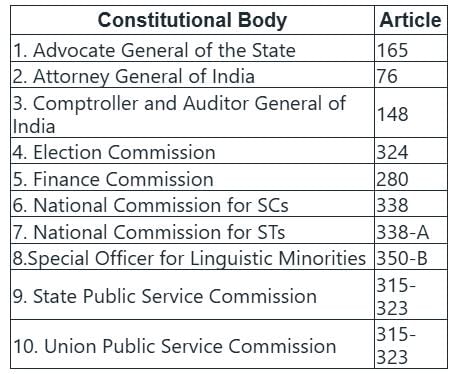Test: Constitution & Political System - 2 - UPSC MCQ
20 Questions MCQ Test - Test: Constitution & Political System - 2
Consider the following statements regarding the Directive Principles of State Policy:
1. The Principles spell out the socio-economic democracy in the country.
2. The provisions contained in these Principles are not enforceable by any court.
Which of the statements given above is / are correct?
[2015]
1. The Principles spell out the socio-economic democracy in the country.
2. The provisions contained in these Principles are not enforceable by any court.
Which of the statements given above is / are correct?
The ideal of Welfare State' in the Indian Constitution is enshrined in its
[2015]
| 1 Crore+ students have signed up on EduRev. Have you? Download the App |
"To uphold and protect the Sovereignty, Unity and Integrity of India" is a provision made in the
[2015]
Who/Which of the following is the custodian of the Constitution of India?
[2015]
The provisions in Fifth Schedule and Sixth Schedule in the Constitution of India are made in order to
[2015]
In the Constitution of India, promotion of international peace and security is included in the
[2014]
Which one of the following Schedules of the Constitution of India contains provisions regarding anti-defection?
[2014]
‘Economic Justice’ as one of the objectives of the Indian Constitution has been provided in
[2013]
Consider the following statements:
1. National Development Council is an organ of the Planning Commission.
2. The Economic and Social Planning is kept in the Concurrent List in the Constitution of India.
3. The Constitution of India prescribes that Panchayats should be assigned the task of preparation of plans for economic development and social justice.
Which of the statements given above is/are correct?
[2013]
Which of the following bodies does not/do not find mention in the Constitution?
1. National Development Council
2. Planning Commission
3. Zonal Councils
Select the correct answer using the codes given below.
[2013]
Consider the following statements:
1. An amendment to the Constitution of India can be initiated by an introduction of a bill in the Lok Sabha only.
2. If such an amendment seeks to make changes in the federal character of the Constitution, the amendment also requires to be ratified by the legislature of all the States of India.
Which of the statements given above is/are correct?
[2013]
According to the Constitution of India, which of the following are fundamental for the governance of the country?
[2013]
With reference to Indian History, the Members of the Constituent Assembly from the Provinces were
[2013]
The distribution of powers between the Centre and the States in the Indian Constitution is based on the Act provided in the
[2012]
Which of the following is/are among the Fundamental Duties of citizens laid down in the Indian Constitution?
1. To preserve the rich heritage of our composite culture
2. To protect the weaker sections from social injustice
3. To develop the scientific temper and spirit of inquiry
4. To strive towards excellence in all spheres of individual and collective activity
Select the correct answer using the codes given below :
[2012]
According to the Constitution of India, it is the duty of the President of India to cause to be laid before the Parliament which of the following?
1. The Recommendations of the Union Finance Commission
2. The Report of the Public Accounts Committee
3. The Report of the Comptroller and Auditor General
4. The Report of the National Commission for Scheduled Castes
Select the correct answer using the codes given below :
[2012]
Which of the following provisions of the Constitution of India have a bearing on Education?
1. Directive Principles of State Policy
2. Rural and Urban Local Bodies
3. Fifth Schedule
4. Sixth Schedule
5. Seventh Schedule
Select the correct answer using the codes given below :
[2012]
Which of the following special powers have been conferred on the Rajya Sabha by the Constitution of India?
[2012]
Consider the following provisions under the Directive Principles of State Policy as enshrined in the Constitution of India :
1. Securing for citizens of India a uniform civil code
2. Organizing village Panchayats
3. Promoting cottage industries in rural areas
4. Securing for all the workers reasonable leisure and cultural opportunities
Which of the above are the Gandhian Principles that are reflected in the Directive Principles of State Policy?
[2012]
Under the Constitution of India, which one of the following is not a fundamental duty?
[2011]


















